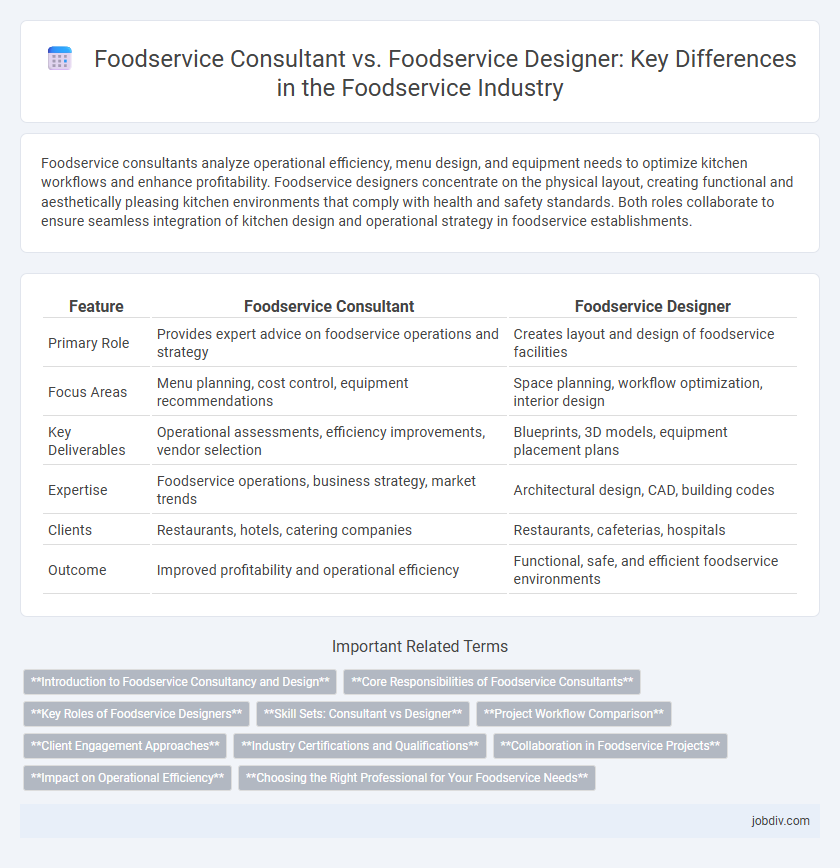Foodservice consultants analyze operational efficiency, menu design, and equipment needs to optimize kitchen workflows and enhance profitability. Foodservice designers concentrate on the physical layout, creating functional and aesthetically pleasing kitchen environments that comply with health and safety standards. Both roles collaborate to ensure seamless integration of kitchen design and operational strategy in foodservice establishments.
Table of Comparison
| Feature | Foodservice Consultant | Foodservice Designer |
|---|---|---|
| Primary Role | Provides expert advice on foodservice operations and strategy | Creates layout and design of foodservice facilities |
| Focus Areas | Menu planning, cost control, equipment recommendations | Space planning, workflow optimization, interior design |
| Key Deliverables | Operational assessments, efficiency improvements, vendor selection | Blueprints, 3D models, equipment placement plans |
| Expertise | Foodservice operations, business strategy, market trends | Architectural design, CAD, building codes |
| Clients | Restaurants, hotels, catering companies | Restaurants, cafeterias, hospitals |
| Outcome | Improved profitability and operational efficiency | Functional, safe, and efficient foodservice environments |
Introduction to Foodservice Consultancy and Design
Foodservice consultancy involves expert guidance on operational efficiency, menu development, and equipment selection to optimize kitchen performance and profitability. Foodservice designers specialize in creating functional and aesthetic kitchen layouts and dining environments tailored to client needs and industry standards. Both roles collaborate to ensure seamless integration of workflow, technology, and customer experience in foodservice operations.
Core Responsibilities of Foodservice Consultants
Foodservice consultants specialize in analyzing operational workflows, menu development, and cost control strategies to enhance efficiency and profitability in foodservice establishments. They conduct market research, create financial projections, and provide expert advice on equipment selection and vendor negotiations. Their core responsibility is to deliver tailored solutions that optimize kitchen performance, streamline service processes, and improve overall guest satisfaction.
Key Roles of Foodservice Designers
Foodservice designers specialize in creating efficient kitchen layouts and workflow systems that optimize operational productivity and food safety standards. They focus on space planning, equipment selection, and compliance with health regulations to ensure seamless food preparation and service processes. Their expertise integrates ergonomic design principles with technological advancements to enhance overall customer experience and staff performance.
Skill Sets: Consultant vs Designer
Foodservice consultants possess expertise in operational efficiency, cost control, and strategic planning, ensuring optimal workflow and profitability for foodservice establishments. Foodservice designers specialize in spatial planning, equipment selection, and aesthetic considerations to create functional and visually appealing kitchen and dining environments. Both roles require a strong understanding of food industry standards, but consultants emphasize business analytics while designers prioritize architectural and ergonomic design.
Project Workflow Comparison
Foodservice consultants focus on strategic planning, menu development, and operational efficiency to optimize foodservice performance, providing actionable insights during the initial project phases. Foodservice designers specialize in the architectural layout, equipment specification, and spatial ergonomics to ensure functionality and compliance, driving the detailed design and construction stages. Effective project workflow integrates consultants' operational recommendations with designers' technical designs to deliver a cohesive and efficient foodservice environment.
Client Engagement Approaches
Foodservice consultants prioritize comprehensive client engagement through detailed needs assessments, operational analysis, and tailored solution proposals to optimize kitchen efficiency and profitability. Foodservice designers engage clients by combining functional requirements with aesthetic considerations, using collaborative design workshops and 3D modeling to visualize space planning and workflow. Both roles rely on iterative feedback and open communication to ensure alignment with client goals, budget constraints, and regulatory compliance.
Industry Certifications and Qualifications
Foodservice consultants typically hold industry certifications such as Certified Foodservice Professional (CFSP) or Certified Foodservice Executive (CFE), demonstrating expertise in operations, management, and food safety standards. Foodservice designers often acquire credentials like NCIDQ (National Council for Interior Design Qualifications) or specialize in LEED accreditation, emphasizing sustainable and compliant kitchen layouts. Both roles require a deep understanding of health codes, ergonomics, and equipment specifications, but their certifications reflect their distinct focus on operational strategy versus spatial design.
Collaboration in Foodservice Projects
Foodservice consultants and foodservice designers collaborate closely to create efficient, functional, and innovative kitchen environments tailored to client needs. Consultants provide operational insights and strategic planning, while designers focus on layout optimization, equipment specification, and aesthetic appeal. This partnership ensures seamless integration of workflow, compliance with health regulations, and maximized productivity in foodservice projects.
Impact on Operational Efficiency
Foodservice consultants analyze operational workflows and recommend strategic improvements that streamline processes, reduce waste, and enhance cost control, directly boosting operational efficiency. Foodservice designers focus on creating optimized kitchen layouts and ergonomic environments that facilitate smoother staff movement and faster service delivery. Both roles contribute to operational efficiency by aligning design and strategy with the specific needs of foodservice establishments.
Choosing the Right Professional for Your Foodservice Needs
Selecting the right professional for your foodservice project depends on your specific needs: a Foodservice Consultant provides strategic advice on menu planning, operational efficiency, and cost control, while a Foodservice Designer focuses on the layout, equipment selection, and creating functional kitchen environments. Understanding that Consultants optimize business performance and Designers enhance physical workspace helps ensure you invest in expertise aligned with your goals. Clear communication of project scope and desired outcomes is crucial for achieving optimal results in foodservice operations.
Foodservice Consultant vs Foodservice Designer Infographic

 jobdiv.com
jobdiv.com